LAW 8500: In-depth Analysis of Agency and Trusts Principles
VerifiedAdded on 2023/06/12
|9
|2114
|385
Report
AI Summary
This report provides a detailed legal analysis of agency and trusts within the Australian commercial law context, specifically addressing issues related to certainty in trust creation and the authority of agents in corporate settings. The first part examines the three certainties required for establishing a valid trust: intention, subject matter, and object, using relevant case law to illustrate these principles. It concludes that declaring oneself a trustee without identifying beneficiaries does not establish a valid trust. The second part explores agency principles, focusing on the authority of de facto directors and the enforceability of contracts entered into by agents. It references the Corporations Act 2001 (Cth) and case law, arguing that a de facto director, recognized by the board's acquiescence, possesses the actual implied authority to bind the company. The report determines that the company is liable for contracts entered into by such a director. This document is available on Desklib, a platform offering study tools and resources for students.
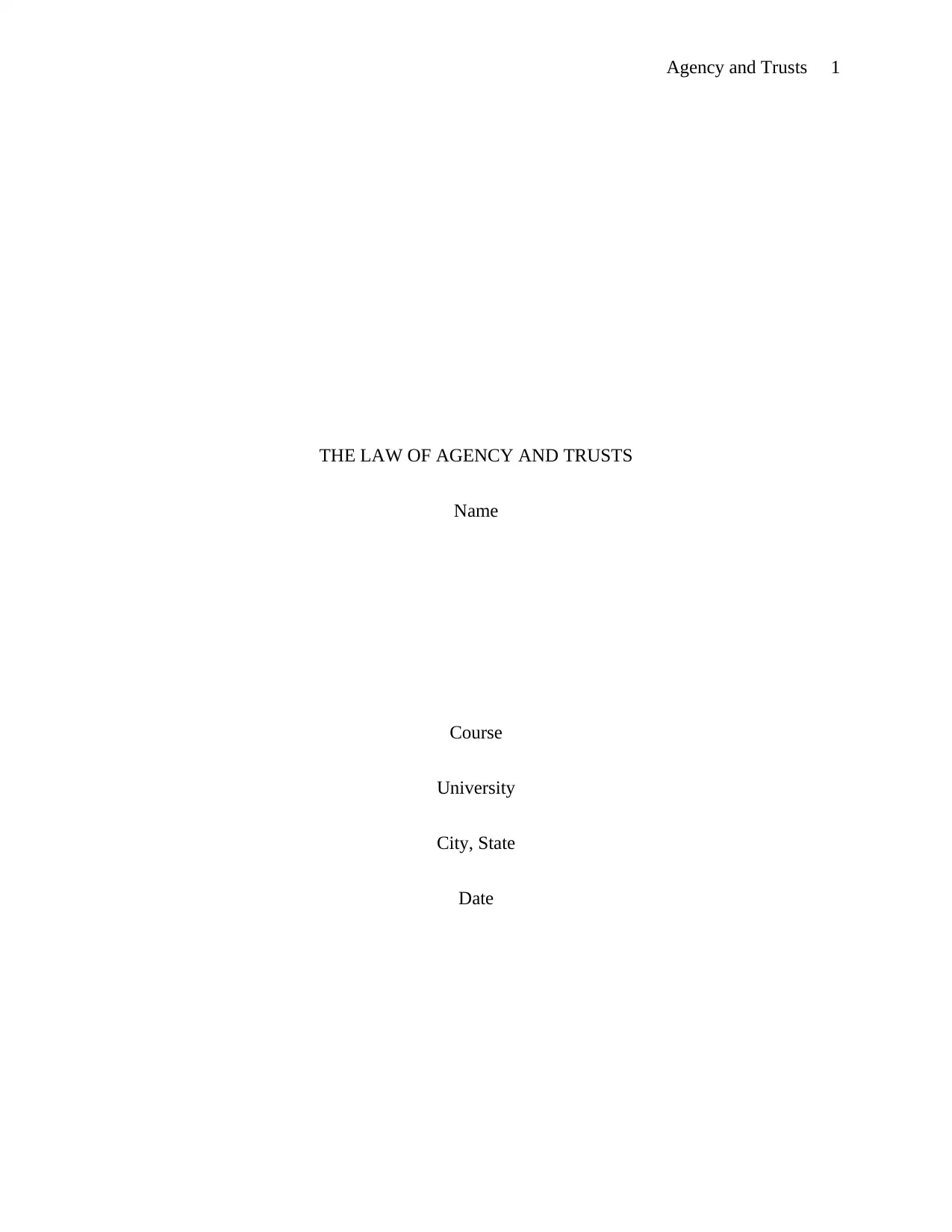
Agency and Trusts 1
THE LAW OF AGENCY AND TRUSTS
Name
Course
University
City, State
Date
THE LAW OF AGENCY AND TRUSTS
Name
Course
University
City, State
Date
Paraphrase This Document
Need a fresh take? Get an instant paraphrase of this document with our AI Paraphraser
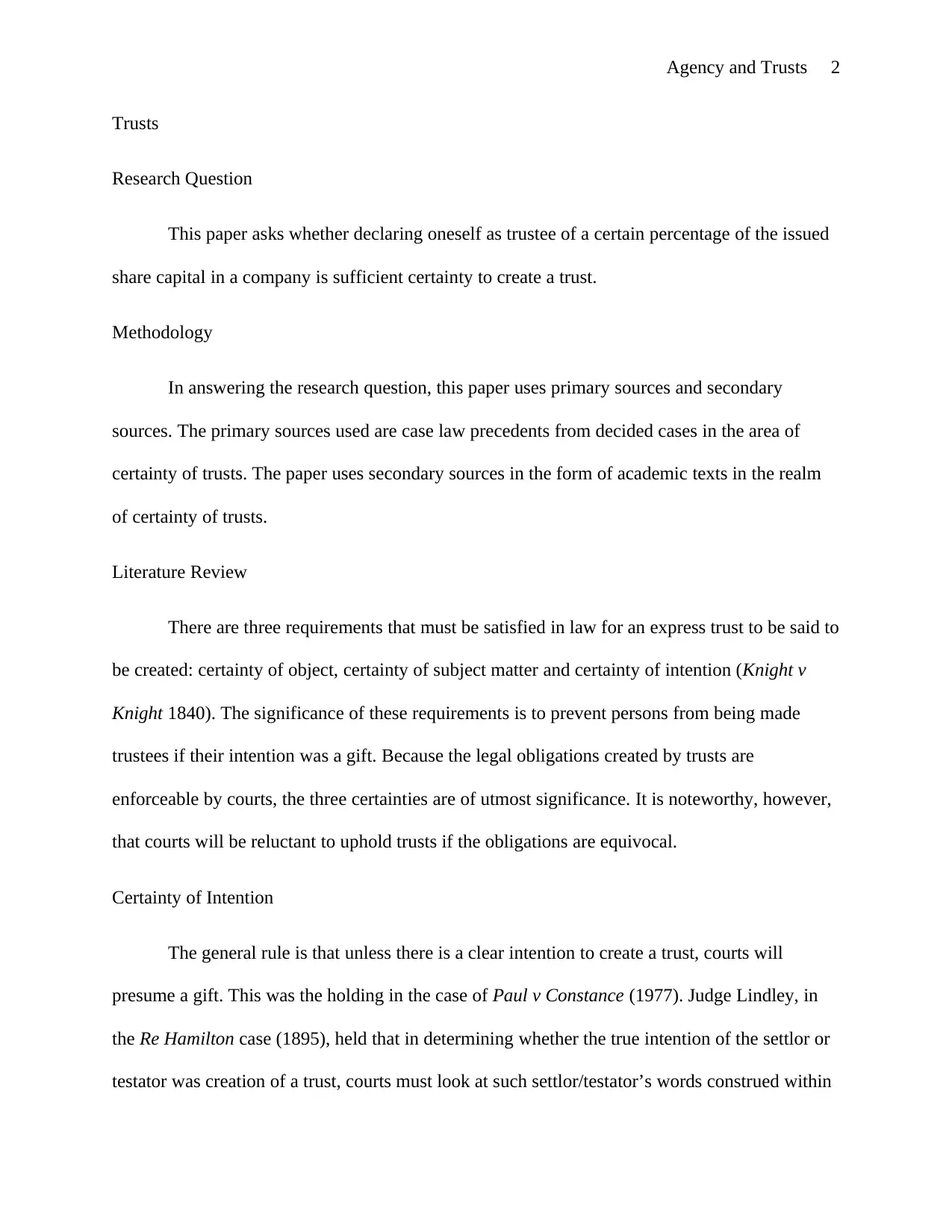
Agency and Trusts 2
Trusts
Research Question
This paper asks whether declaring oneself as trustee of a certain percentage of the issued
share capital in a company is sufficient certainty to create a trust.
Methodology
In answering the research question, this paper uses primary sources and secondary
sources. The primary sources used are case law precedents from decided cases in the area of
certainty of trusts. The paper uses secondary sources in the form of academic texts in the realm
of certainty of trusts.
Literature Review
There are three requirements that must be satisfied in law for an express trust to be said to
be created: certainty of object, certainty of subject matter and certainty of intention (Knight v
Knight 1840). The significance of these requirements is to prevent persons from being made
trustees if their intention was a gift. Because the legal obligations created by trusts are
enforceable by courts, the three certainties are of utmost significance. It is noteworthy, however,
that courts will be reluctant to uphold trusts if the obligations are equivocal.
Certainty of Intention
The general rule is that unless there is a clear intention to create a trust, courts will
presume a gift. This was the holding in the case of Paul v Constance (1977). Judge Lindley, in
the Re Hamilton case (1895), held that in determining whether the true intention of the settlor or
testator was creation of a trust, courts must look at such settlor/testator’s words construed within
Trusts
Research Question
This paper asks whether declaring oneself as trustee of a certain percentage of the issued
share capital in a company is sufficient certainty to create a trust.
Methodology
In answering the research question, this paper uses primary sources and secondary
sources. The primary sources used are case law precedents from decided cases in the area of
certainty of trusts. The paper uses secondary sources in the form of academic texts in the realm
of certainty of trusts.
Literature Review
There are three requirements that must be satisfied in law for an express trust to be said to
be created: certainty of object, certainty of subject matter and certainty of intention (Knight v
Knight 1840). The significance of these requirements is to prevent persons from being made
trustees if their intention was a gift. Because the legal obligations created by trusts are
enforceable by courts, the three certainties are of utmost significance. It is noteworthy, however,
that courts will be reluctant to uphold trusts if the obligations are equivocal.
Certainty of Intention
The general rule is that unless there is a clear intention to create a trust, courts will
presume a gift. This was the holding in the case of Paul v Constance (1977). Judge Lindley, in
the Re Hamilton case (1895), held that in determining whether the true intention of the settlor or
testator was creation of a trust, courts must look at such settlor/testator’s words construed within
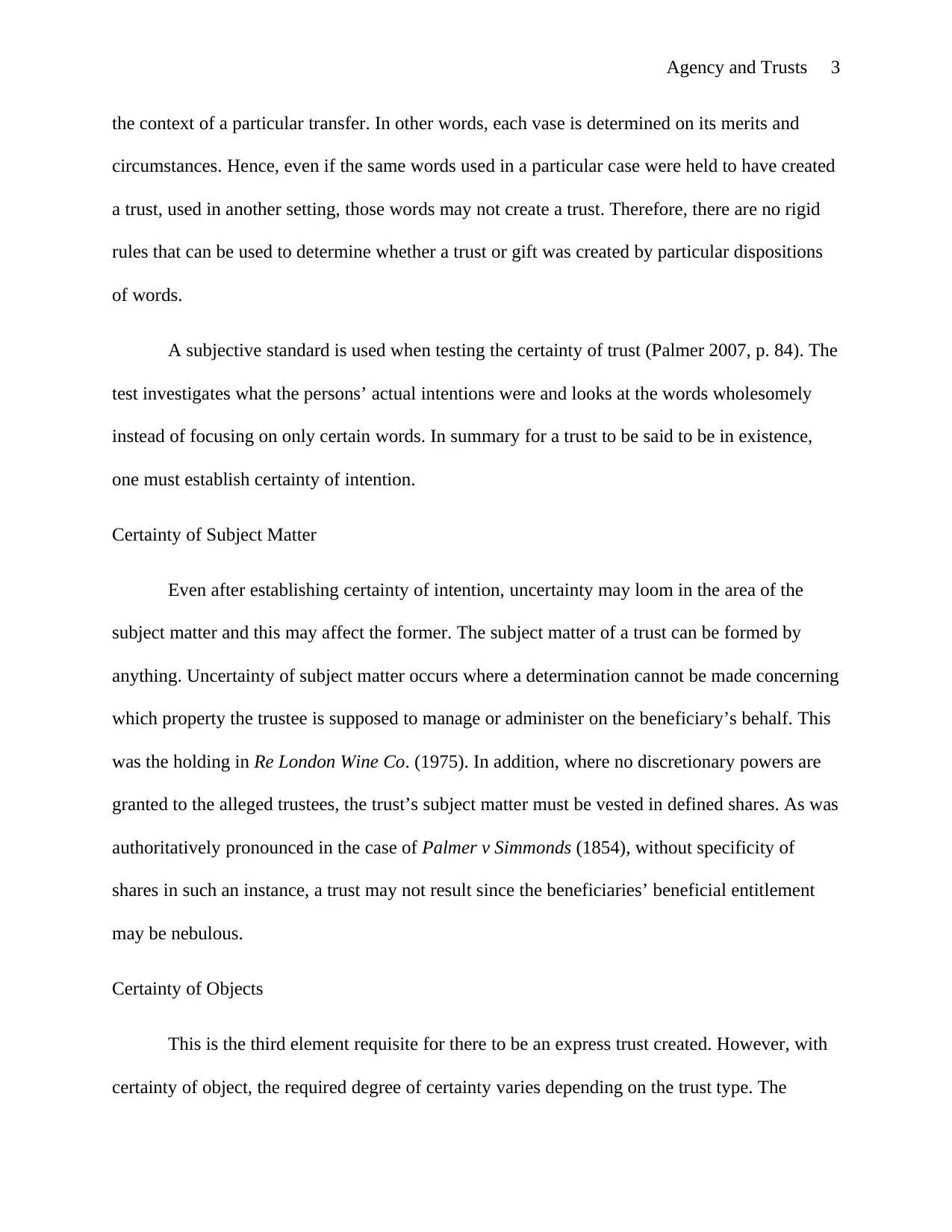
Agency and Trusts 3
the context of a particular transfer. In other words, each vase is determined on its merits and
circumstances. Hence, even if the same words used in a particular case were held to have created
a trust, used in another setting, those words may not create a trust. Therefore, there are no rigid
rules that can be used to determine whether a trust or gift was created by particular dispositions
of words.
A subjective standard is used when testing the certainty of trust (Palmer 2007, p. 84). The
test investigates what the persons’ actual intentions were and looks at the words wholesomely
instead of focusing on only certain words. In summary for a trust to be said to be in existence,
one must establish certainty of intention.
Certainty of Subject Matter
Even after establishing certainty of intention, uncertainty may loom in the area of the
subject matter and this may affect the former. The subject matter of a trust can be formed by
anything. Uncertainty of subject matter occurs where a determination cannot be made concerning
which property the trustee is supposed to manage or administer on the beneficiary’s behalf. This
was the holding in Re London Wine Co. (1975). In addition, where no discretionary powers are
granted to the alleged trustees, the trust’s subject matter must be vested in defined shares. As was
authoritatively pronounced in the case of Palmer v Simmonds (1854), without specificity of
shares in such an instance, a trust may not result since the beneficiaries’ beneficial entitlement
may be nebulous.
Certainty of Objects
This is the third element requisite for there to be an express trust created. However, with
certainty of object, the required degree of certainty varies depending on the trust type. The
the context of a particular transfer. In other words, each vase is determined on its merits and
circumstances. Hence, even if the same words used in a particular case were held to have created
a trust, used in another setting, those words may not create a trust. Therefore, there are no rigid
rules that can be used to determine whether a trust or gift was created by particular dispositions
of words.
A subjective standard is used when testing the certainty of trust (Palmer 2007, p. 84). The
test investigates what the persons’ actual intentions were and looks at the words wholesomely
instead of focusing on only certain words. In summary for a trust to be said to be in existence,
one must establish certainty of intention.
Certainty of Subject Matter
Even after establishing certainty of intention, uncertainty may loom in the area of the
subject matter and this may affect the former. The subject matter of a trust can be formed by
anything. Uncertainty of subject matter occurs where a determination cannot be made concerning
which property the trustee is supposed to manage or administer on the beneficiary’s behalf. This
was the holding in Re London Wine Co. (1975). In addition, where no discretionary powers are
granted to the alleged trustees, the trust’s subject matter must be vested in defined shares. As was
authoritatively pronounced in the case of Palmer v Simmonds (1854), without specificity of
shares in such an instance, a trust may not result since the beneficiaries’ beneficial entitlement
may be nebulous.
Certainty of Objects
This is the third element requisite for there to be an express trust created. However, with
certainty of object, the required degree of certainty varies depending on the trust type. The
⊘ This is a preview!⊘
Do you want full access?
Subscribe today to unlock all pages.

Trusted by 1+ million students worldwide
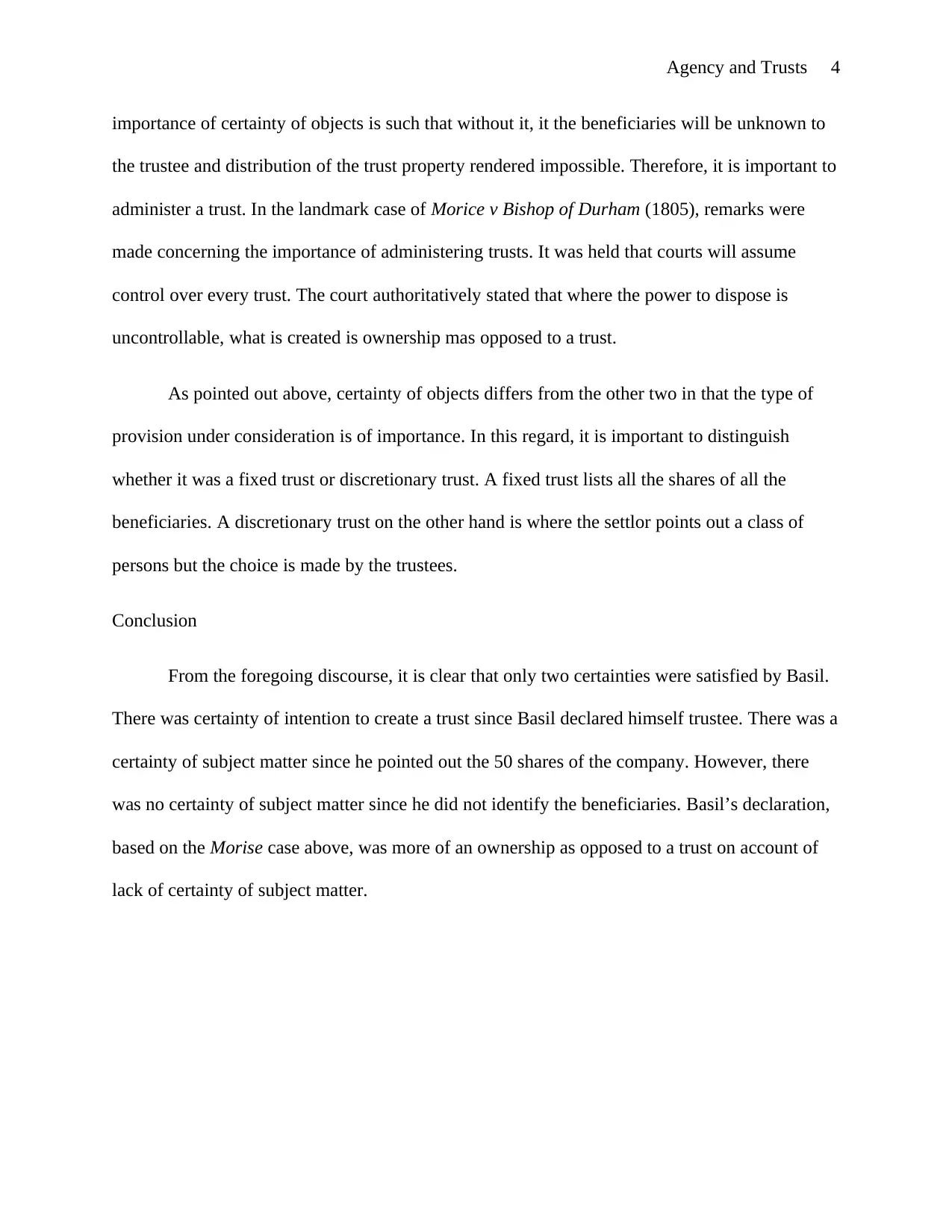
Agency and Trusts 4
importance of certainty of objects is such that without it, it the beneficiaries will be unknown to
the trustee and distribution of the trust property rendered impossible. Therefore, it is important to
administer a trust. In the landmark case of Morice v Bishop of Durham (1805), remarks were
made concerning the importance of administering trusts. It was held that courts will assume
control over every trust. The court authoritatively stated that where the power to dispose is
uncontrollable, what is created is ownership mas opposed to a trust.
As pointed out above, certainty of objects differs from the other two in that the type of
provision under consideration is of importance. In this regard, it is important to distinguish
whether it was a fixed trust or discretionary trust. A fixed trust lists all the shares of all the
beneficiaries. A discretionary trust on the other hand is where the settlor points out a class of
persons but the choice is made by the trustees.
Conclusion
From the foregoing discourse, it is clear that only two certainties were satisfied by Basil.
There was certainty of intention to create a trust since Basil declared himself trustee. There was a
certainty of subject matter since he pointed out the 50 shares of the company. However, there
was no certainty of subject matter since he did not identify the beneficiaries. Basil’s declaration,
based on the Morise case above, was more of an ownership as opposed to a trust on account of
lack of certainty of subject matter.
importance of certainty of objects is such that without it, it the beneficiaries will be unknown to
the trustee and distribution of the trust property rendered impossible. Therefore, it is important to
administer a trust. In the landmark case of Morice v Bishop of Durham (1805), remarks were
made concerning the importance of administering trusts. It was held that courts will assume
control over every trust. The court authoritatively stated that where the power to dispose is
uncontrollable, what is created is ownership mas opposed to a trust.
As pointed out above, certainty of objects differs from the other two in that the type of
provision under consideration is of importance. In this regard, it is important to distinguish
whether it was a fixed trust or discretionary trust. A fixed trust lists all the shares of all the
beneficiaries. A discretionary trust on the other hand is where the settlor points out a class of
persons but the choice is made by the trustees.
Conclusion
From the foregoing discourse, it is clear that only two certainties were satisfied by Basil.
There was certainty of intention to create a trust since Basil declared himself trustee. There was a
certainty of subject matter since he pointed out the 50 shares of the company. However, there
was no certainty of subject matter since he did not identify the beneficiaries. Basil’s declaration,
based on the Morise case above, was more of an ownership as opposed to a trust on account of
lack of certainty of subject matter.
Paraphrase This Document
Need a fresh take? Get an instant paraphrase of this document with our AI Paraphraser
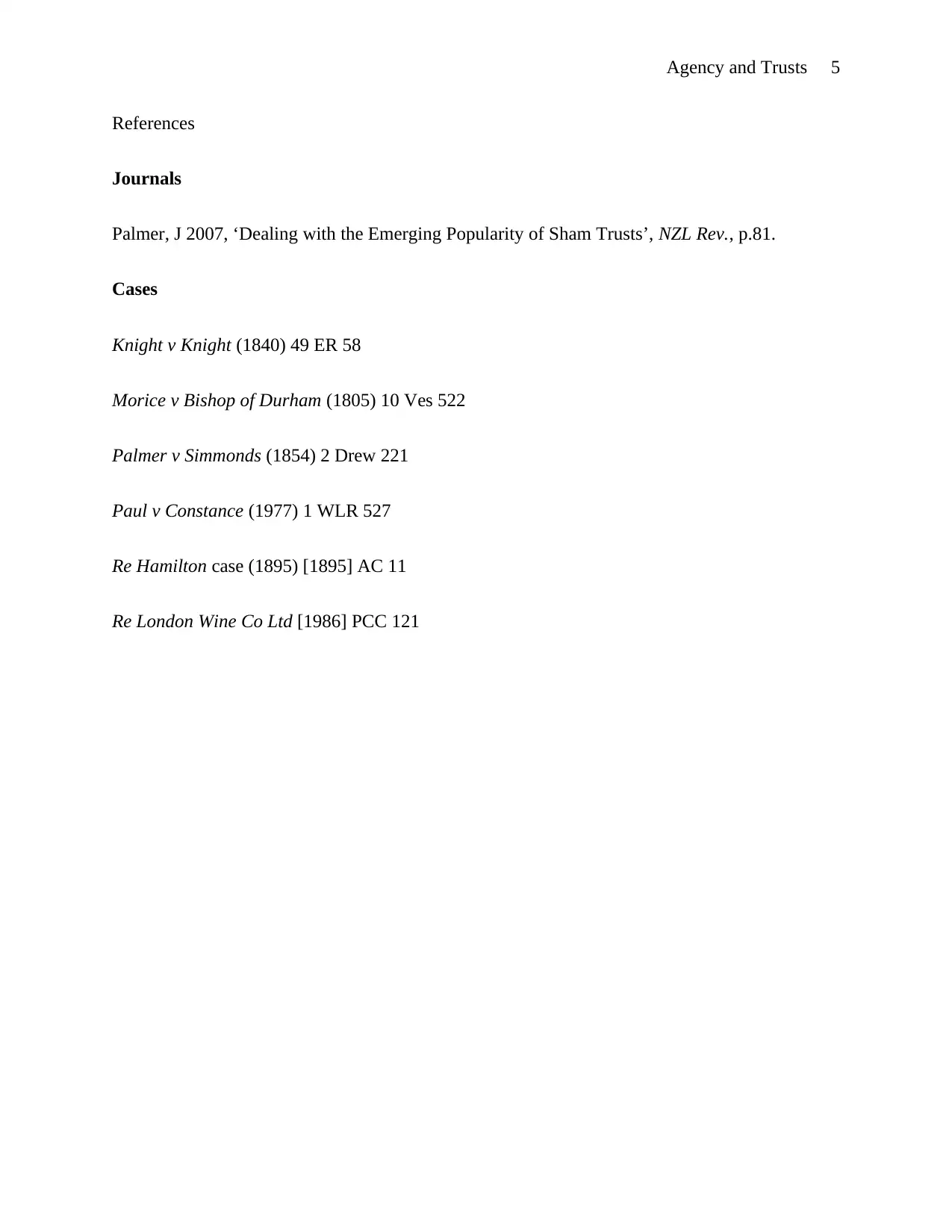
Agency and Trusts 5
References
Journals
Palmer, J 2007, ‘Dealing with the Emerging Popularity of Sham Trusts’, NZL Rev., p.81.
Cases
Knight v Knight (1840) 49 ER 58
Morice v Bishop of Durham (1805) 10 Ves 522
Palmer v Simmonds (1854) 2 Drew 221
Paul v Constance (1977) 1 WLR 527
Re Hamilton case (1895) [1895] AC 11
Re London Wine Co Ltd [1986] PCC 121
References
Journals
Palmer, J 2007, ‘Dealing with the Emerging Popularity of Sham Trusts’, NZL Rev., p.81.
Cases
Knight v Knight (1840) 49 ER 58
Morice v Bishop of Durham (1805) 10 Ves 522
Palmer v Simmonds (1854) 2 Drew 221
Paul v Constance (1977) 1 WLR 527
Re Hamilton case (1895) [1895] AC 11
Re London Wine Co Ltd [1986] PCC 121
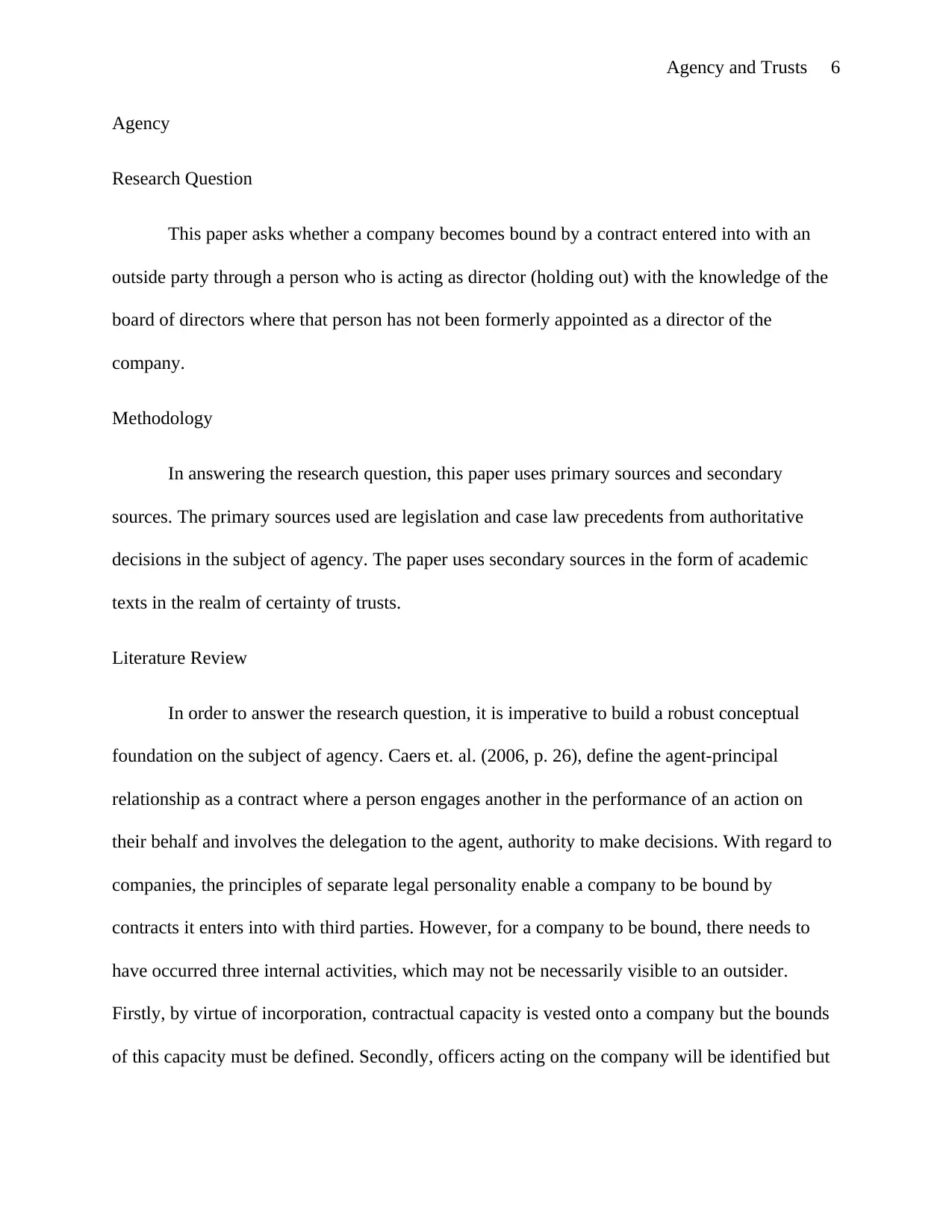
Agency and Trusts 6
Agency
Research Question
This paper asks whether a company becomes bound by a contract entered into with an
outside party through a person who is acting as director (holding out) with the knowledge of the
board of directors where that person has not been formerly appointed as a director of the
company.
Methodology
In answering the research question, this paper uses primary sources and secondary
sources. The primary sources used are legislation and case law precedents from authoritative
decisions in the subject of agency. The paper uses secondary sources in the form of academic
texts in the realm of certainty of trusts.
Literature Review
In order to answer the research question, it is imperative to build a robust conceptual
foundation on the subject of agency. Caers et. al. (2006, p. 26), define the agent-principal
relationship as a contract where a person engages another in the performance of an action on
their behalf and involves the delegation to the agent, authority to make decisions. With regard to
companies, the principles of separate legal personality enable a company to be bound by
contracts it enters into with third parties. However, for a company to be bound, there needs to
have occurred three internal activities, which may not be necessarily visible to an outsider.
Firstly, by virtue of incorporation, contractual capacity is vested onto a company but the bounds
of this capacity must be defined. Secondly, officers acting on the company will be identified but
Agency
Research Question
This paper asks whether a company becomes bound by a contract entered into with an
outside party through a person who is acting as director (holding out) with the knowledge of the
board of directors where that person has not been formerly appointed as a director of the
company.
Methodology
In answering the research question, this paper uses primary sources and secondary
sources. The primary sources used are legislation and case law precedents from authoritative
decisions in the subject of agency. The paper uses secondary sources in the form of academic
texts in the realm of certainty of trusts.
Literature Review
In order to answer the research question, it is imperative to build a robust conceptual
foundation on the subject of agency. Caers et. al. (2006, p. 26), define the agent-principal
relationship as a contract where a person engages another in the performance of an action on
their behalf and involves the delegation to the agent, authority to make decisions. With regard to
companies, the principles of separate legal personality enable a company to be bound by
contracts it enters into with third parties. However, for a company to be bound, there needs to
have occurred three internal activities, which may not be necessarily visible to an outsider.
Firstly, by virtue of incorporation, contractual capacity is vested onto a company but the bounds
of this capacity must be defined. Secondly, officers acting on the company will be identified but
⊘ This is a preview!⊘
Do you want full access?
Subscribe today to unlock all pages.

Trusted by 1+ million students worldwide
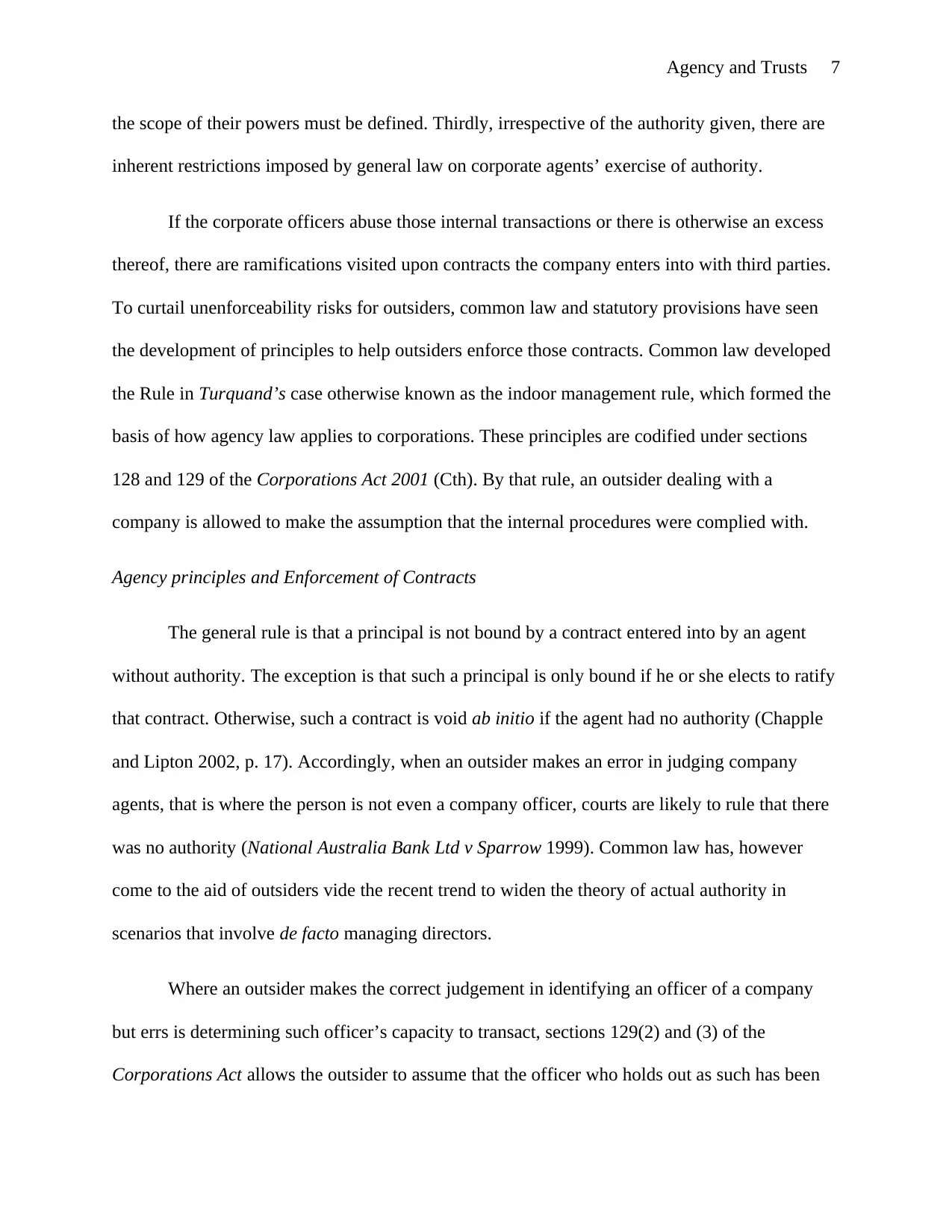
Agency and Trusts 7
the scope of their powers must be defined. Thirdly, irrespective of the authority given, there are
inherent restrictions imposed by general law on corporate agents’ exercise of authority.
If the corporate officers abuse those internal transactions or there is otherwise an excess
thereof, there are ramifications visited upon contracts the company enters into with third parties.
To curtail unenforceability risks for outsiders, common law and statutory provisions have seen
the development of principles to help outsiders enforce those contracts. Common law developed
the Rule in Turquand’s case otherwise known as the indoor management rule, which formed the
basis of how agency law applies to corporations. These principles are codified under sections
128 and 129 of the Corporations Act 2001 (Cth). By that rule, an outsider dealing with a
company is allowed to make the assumption that the internal procedures were complied with.
Agency principles and Enforcement of Contracts
The general rule is that a principal is not bound by a contract entered into by an agent
without authority. The exception is that such a principal is only bound if he or she elects to ratify
that contract. Otherwise, such a contract is void ab initio if the agent had no authority (Chapple
and Lipton 2002, p. 17). Accordingly, when an outsider makes an error in judging company
agents, that is where the person is not even a company officer, courts are likely to rule that there
was no authority (National Australia Bank Ltd v Sparrow 1999). Common law has, however
come to the aid of outsiders vide the recent trend to widen the theory of actual authority in
scenarios that involve de facto managing directors.
Where an outsider makes the correct judgement in identifying an officer of a company
but errs is determining such officer’s capacity to transact, sections 129(2) and (3) of the
Corporations Act allows the outsider to assume that the officer who holds out as such has been
the scope of their powers must be defined. Thirdly, irrespective of the authority given, there are
inherent restrictions imposed by general law on corporate agents’ exercise of authority.
If the corporate officers abuse those internal transactions or there is otherwise an excess
thereof, there are ramifications visited upon contracts the company enters into with third parties.
To curtail unenforceability risks for outsiders, common law and statutory provisions have seen
the development of principles to help outsiders enforce those contracts. Common law developed
the Rule in Turquand’s case otherwise known as the indoor management rule, which formed the
basis of how agency law applies to corporations. These principles are codified under sections
128 and 129 of the Corporations Act 2001 (Cth). By that rule, an outsider dealing with a
company is allowed to make the assumption that the internal procedures were complied with.
Agency principles and Enforcement of Contracts
The general rule is that a principal is not bound by a contract entered into by an agent
without authority. The exception is that such a principal is only bound if he or she elects to ratify
that contract. Otherwise, such a contract is void ab initio if the agent had no authority (Chapple
and Lipton 2002, p. 17). Accordingly, when an outsider makes an error in judging company
agents, that is where the person is not even a company officer, courts are likely to rule that there
was no authority (National Australia Bank Ltd v Sparrow 1999). Common law has, however
come to the aid of outsiders vide the recent trend to widen the theory of actual authority in
scenarios that involve de facto managing directors.
Where an outsider makes the correct judgement in identifying an officer of a company
but errs is determining such officer’s capacity to transact, sections 129(2) and (3) of the
Corporations Act allows the outsider to assume that the officer who holds out as such has been
Paraphrase This Document
Need a fresh take? Get an instant paraphrase of this document with our AI Paraphraser
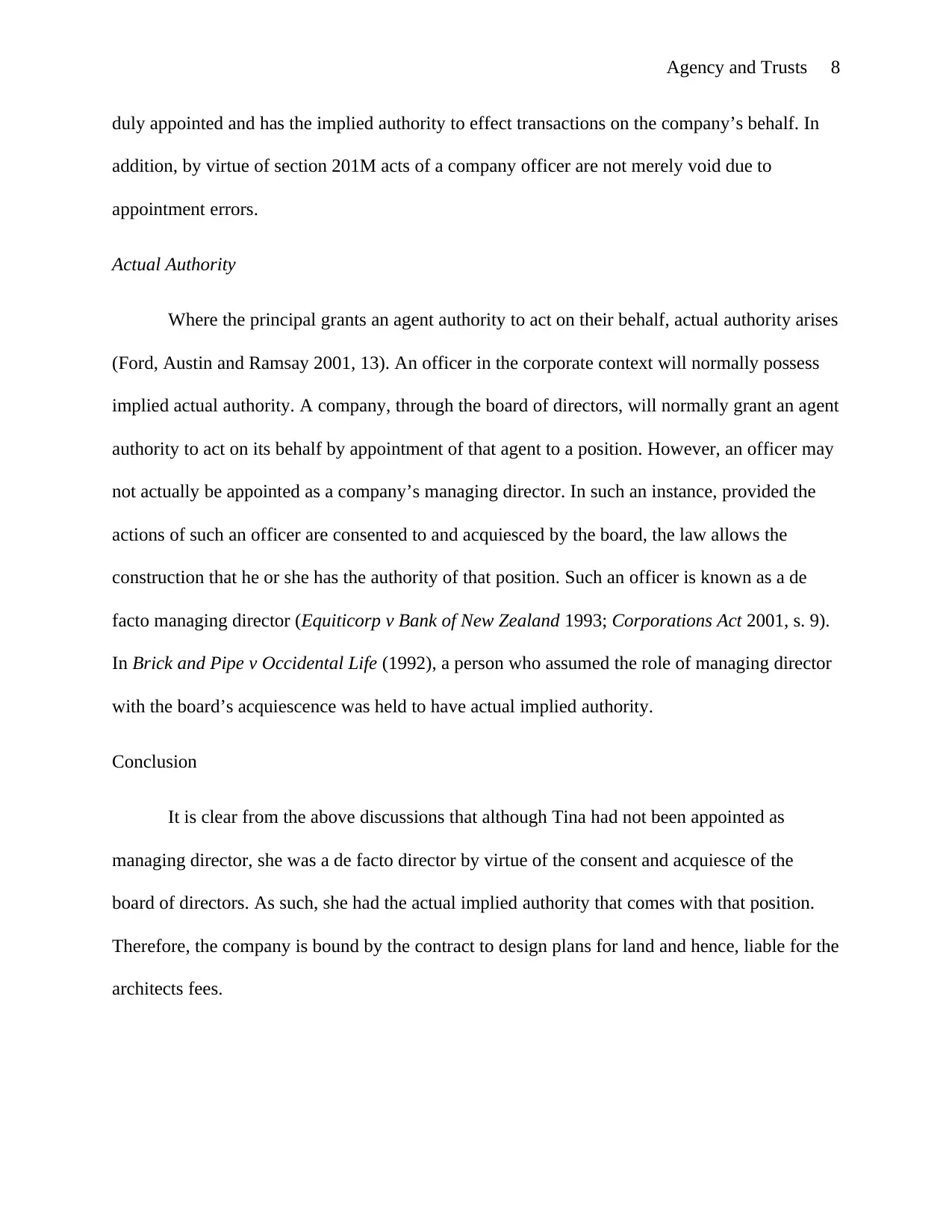
Agency and Trusts 8
duly appointed and has the implied authority to effect transactions on the company’s behalf. In
addition, by virtue of section 201M acts of a company officer are not merely void due to
appointment errors.
Actual Authority
Where the principal grants an agent authority to act on their behalf, actual authority arises
(Ford, Austin and Ramsay 2001, 13). An officer in the corporate context will normally possess
implied actual authority. A company, through the board of directors, will normally grant an agent
authority to act on its behalf by appointment of that agent to a position. However, an officer may
not actually be appointed as a company’s managing director. In such an instance, provided the
actions of such an officer are consented to and acquiesced by the board, the law allows the
construction that he or she has the authority of that position. Such an officer is known as a de
facto managing director (Equiticorp v Bank of New Zealand 1993; Corporations Act 2001, s. 9).
In Brick and Pipe v Occidental Life (1992), a person who assumed the role of managing director
with the board’s acquiescence was held to have actual implied authority.
Conclusion
It is clear from the above discussions that although Tina had not been appointed as
managing director, she was a de facto director by virtue of the consent and acquiesce of the
board of directors. As such, she had the actual implied authority that comes with that position.
Therefore, the company is bound by the contract to design plans for land and hence, liable for the
architects fees.
duly appointed and has the implied authority to effect transactions on the company’s behalf. In
addition, by virtue of section 201M acts of a company officer are not merely void due to
appointment errors.
Actual Authority
Where the principal grants an agent authority to act on their behalf, actual authority arises
(Ford, Austin and Ramsay 2001, 13). An officer in the corporate context will normally possess
implied actual authority. A company, through the board of directors, will normally grant an agent
authority to act on its behalf by appointment of that agent to a position. However, an officer may
not actually be appointed as a company’s managing director. In such an instance, provided the
actions of such an officer are consented to and acquiesced by the board, the law allows the
construction that he or she has the authority of that position. Such an officer is known as a de
facto managing director (Equiticorp v Bank of New Zealand 1993; Corporations Act 2001, s. 9).
In Brick and Pipe v Occidental Life (1992), a person who assumed the role of managing director
with the board’s acquiescence was held to have actual implied authority.
Conclusion
It is clear from the above discussions that although Tina had not been appointed as
managing director, she was a de facto director by virtue of the consent and acquiesce of the
board of directors. As such, she had the actual implied authority that comes with that position.
Therefore, the company is bound by the contract to design plans for land and hence, liable for the
architects fees.
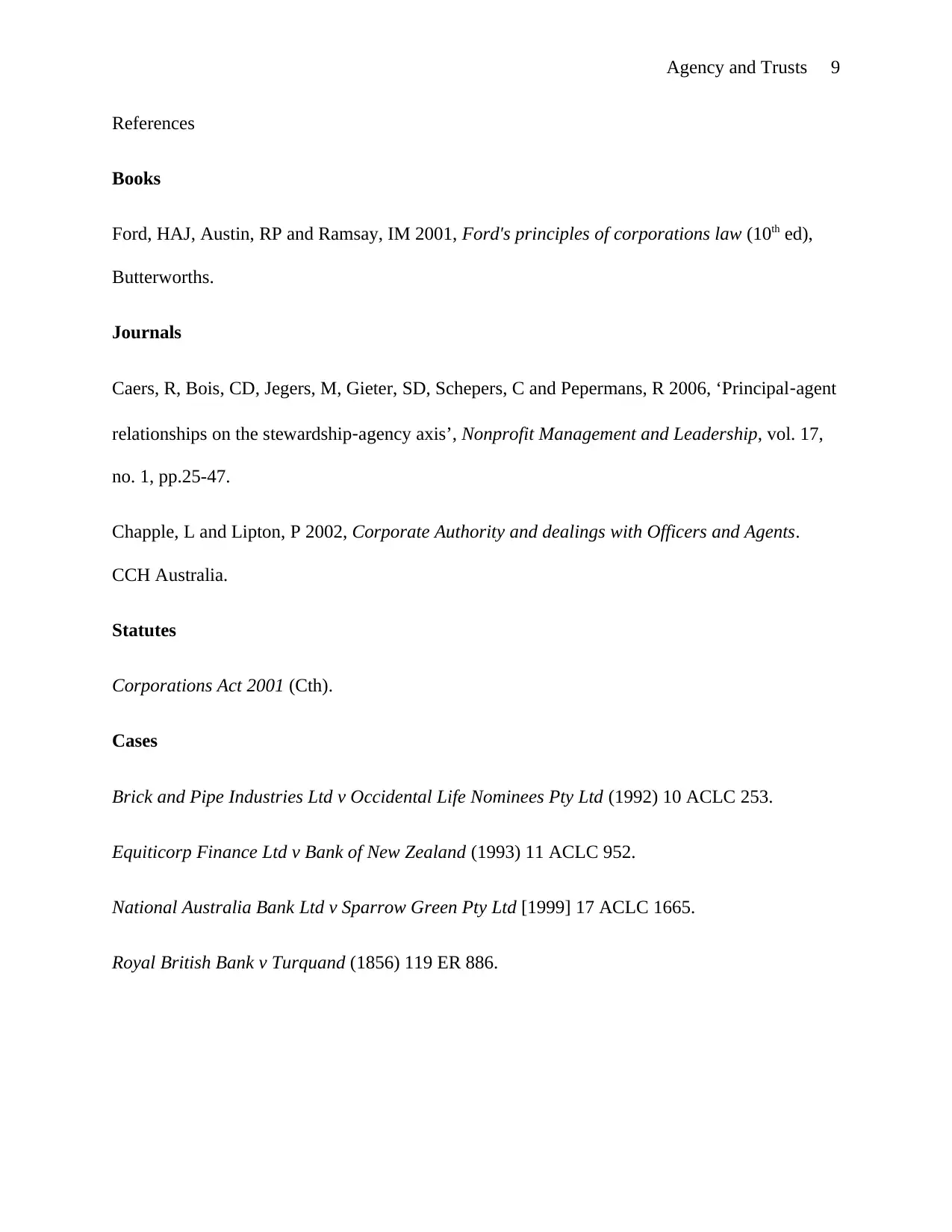
Agency and Trusts 9
References
Books
Ford, HAJ, Austin, RP and Ramsay, IM 2001, Ford's principles of corporations law (10th ed),
Butterworths.
Journals
Caers, R, Bois, CD, Jegers, M, Gieter, SD, Schepers, C and Pepermans, R 2006, ‘Principal‐agent
relationships on the stewardship‐agency axis’, Nonprofit Management and Leadership, vol. 17,
no. 1, pp.25-47.
Chapple, L and Lipton, P 2002, Corporate Authority and dealings with Officers and Agents.
CCH Australia.
Statutes
Corporations Act 2001 (Cth).
Cases
Brick and Pipe Industries Ltd v Occidental Life Nominees Pty Ltd (1992) 10 ACLC 253.
Equiticorp Finance Ltd v Bank of New Zealand (1993) 11 ACLC 952.
National Australia Bank Ltd v Sparrow Green Pty Ltd [1999] 17 ACLC 1665.
Royal British Bank v Turquand (1856) 119 ER 886.
References
Books
Ford, HAJ, Austin, RP and Ramsay, IM 2001, Ford's principles of corporations law (10th ed),
Butterworths.
Journals
Caers, R, Bois, CD, Jegers, M, Gieter, SD, Schepers, C and Pepermans, R 2006, ‘Principal‐agent
relationships on the stewardship‐agency axis’, Nonprofit Management and Leadership, vol. 17,
no. 1, pp.25-47.
Chapple, L and Lipton, P 2002, Corporate Authority and dealings with Officers and Agents.
CCH Australia.
Statutes
Corporations Act 2001 (Cth).
Cases
Brick and Pipe Industries Ltd v Occidental Life Nominees Pty Ltd (1992) 10 ACLC 253.
Equiticorp Finance Ltd v Bank of New Zealand (1993) 11 ACLC 952.
National Australia Bank Ltd v Sparrow Green Pty Ltd [1999] 17 ACLC 1665.
Royal British Bank v Turquand (1856) 119 ER 886.
⊘ This is a preview!⊘
Do you want full access?
Subscribe today to unlock all pages.

Trusted by 1+ million students worldwide
1 out of 9
Related Documents
Your All-in-One AI-Powered Toolkit for Academic Success.
+13062052269
info@desklib.com
Available 24*7 on WhatsApp / Email
![[object Object]](/_next/static/media/star-bottom.7253800d.svg)
Unlock your academic potential
Copyright © 2020–2025 A2Z Services. All Rights Reserved. Developed and managed by ZUCOL.





